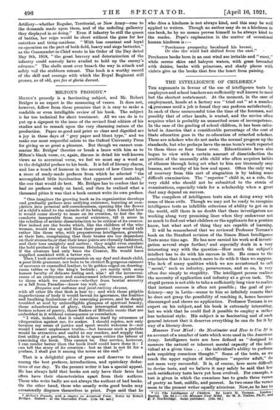MILTON'S PROSODY.*
MILTON'S prosody is a fascinating subject, and Mr. Robert Bridges is an expert in the measuring of verses. It does not, however, follow from these premises that it is easy to make a readable or even intelligible review of his book. The subject is far too technical for short treatment. All we can do is to put up a signpost to the issue of the revised final edition of his studies and to remark upon the very charming nature of the production. Paper so good and print so clear and dignified are a joy in these days of " grey paper and blunt type," and we make our most respectful salute to the Oxford University Press for giving us so great a pleasure. But though we cannot sum- marize Mr. Bridges' theories or break a lance with him as to Milton's blank verse, or, again, discuss in detail his well-known views as to accentual verse, we feel we must say a word as to the delightful preface to his book. It is full of literary charm, and has a touch of humour in the account of how Cicero kept a store of ready-made prefaces from which he selected " the accomplished little lucubration that appeared most suitable," the one that would do best. Mr. Bridges has to confess that he had no prefaces ready on hand, and then he realized what a thousand pities it was that a book cannot write its own preface.
" One imagines the growing book as its organisation develops and gradually gathers into unifying existence, bursting at com- pletion into personal self-consciousness, opening like the flower of a child's mind to the miracle of its being ; then I fancied how it would come slowly to muse on its creation, to feel the dis- comforts inseparable from mortal existence, till it arose in the rebellion of artistic dissatisfaction to be critical of its creator. Few indeed are the books which, like the children of the wise woman, would rise up and bless their parent : they would talk rather like those who, with preposterous intelligence, grumble at their fate, complaining that their brains are too dependent on their stomachs,or that their knee-joints are clumsily fashioned, and their toes unsightly and useless ; they might even emulate the bold profanity of the German Helmholz, who asserted that, if the creature had only been the Creator, He would have supplied mankind with a better eye.
Then I took sorrowful compassion on my deaf and dumb child, a poor little grammar, not born to be clothed rn gorgeous raiment of morocco or enamelled leather, to lie golden-edged on drawing- room tables or by the king's bedside ; yet surely with some honest faculty of delicate feeling and, alas ! all the inconveni- ences of an embryonic and embarrassed inheritance, pains like to those which we ourselves—whether from bestial ancestry or a fall from Paradise—know too well, our
Dropsies and asthma and joint-racking rheum*,
with all other ills that flesh is heir to : and with these pitiable imperfections of body it would bewail its ignorance, the frailties and baulking limitations of its reasoning powers, and be deeply troubled at soul by unintelligible glimpses of spiritual beauty, those adumbrations of glory, those interrupted strains and broken echoes of poetry, those flashes of Miltonic music that are embedded in it without consequence or correlation.
" I wish, indeed, that it could relieve itself by .utterance of vituperation against me, its maker. I should rejoice, not only because my sense of justice and sport would welcome it—nor would I resent unpleasant truths,—but because such a prelude would be attractive and useful to my readers, and supply that first utility of a preface, which is to spare critics the labour of examining the book. This cannot be. One service, however, I can render better than the book itself could have done it ; I can tell the story of its creation : but as that is not fit for a preface, I shall put it among the notes at the end."
That is a delightful piece of prose and deserves to stand among the best prefaces, introductions, and epistolary deduc- tions of our day. To the present writer it has a special appeal. He has always held that books not only have their fates but often have their characteristics apart from their authors. Those who write badly are not always the authors of bad books. On the other hand, those who usually write good books may cccaaionally disgrace themselves in print. Pope said that he
• Milton's Prosody. with a chapter on Accentual Verse. Notes by Robert Bridges. Oxford at the Olarendon Press. LIU. dd. net.]
who does a kindness is not always kind, and this may be well applied to writers. Though an author may do us a kindness in one book, he by no means proves himself to be always kind to the reader. Pope's explanation in the matter of occasional human kindness is :—
" Perchance prosperity becalmed his breast,
Or else the wind had shifted from the east." •
Perchance books born in an east wind are irritable and " curst," while serene skies and halcyon waters, with grass brocaded with daisies, banks with primroses, and shady places with violets give us the books that free the heart from paining.


































 Previous page
Previous page